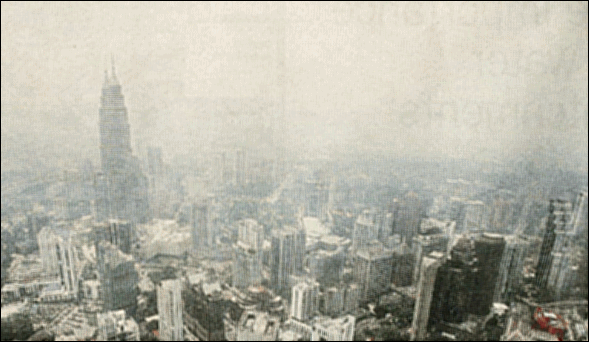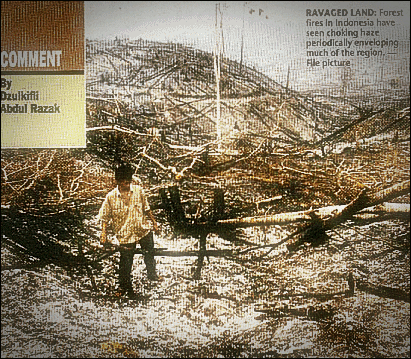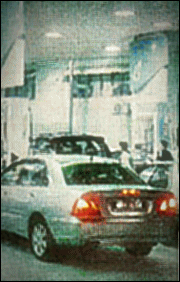Time for education on sustainable development
Dato' Dzulkifli Abd Razak
Article
New Sunday Times - 08/21/2005

NEVER before has the need for sustainable development been more apparent and urgent than the last couple of months when the issue of petroleum price hike and the lingering AP controversy became the talk of the town.
The need for sustainable development was especially felt when vehicles turned up at the petrol stations at the end of last month, no thanks to a further surge in crude oil price — now exceeding US$65 per barrel.
The Government had no choice but to review subsidies for petrol and diesel, said to be the cheapest in the region.
Otherwise, activities such as smuggling and the inefficient use and wasteful of the non-renewable energy source would continue to be unchecked.
More so, as the demand for oil is expected to be on an upward trend (sometimes artificially induced), highlighting the long-felt concern as to how much longer can Malaysia supports its future energy needs.

In fact, globally the same concern is also raised, taking into consideration the predicted rise in consumption in China and India.
Reportedly, the world’s energy demand is expected to jump by at least 50 per cent in the coming decades requiring an estimated daily supply from 10 new "Saudi Arabias", according to a voice from the energy industry recently (WSJ Europe, July 13).
This is just to fill the gap with oil alone. Since there can never be another Saudi Arabia, let alone 10, the future of an energy-dependent world remains unsustainable, unless something is done.
For many developing countries, the prospect is even worse as the bulk of today’s energy is disproportionately gobbled up by the more developed countries, just because they began using oil much earlier.
It is not surprising therefore that their history is filled with many unjust wars and economic aggression as they attempted to ensure the oil supply was uninterrupted.
What appears to most of us as a simple issue of price hike could in the long run have wider and more complex implications to local and global stability, if the issue is not properly understood and handled.
Malaysians can no longer be oblivious to the fact that one day they too will run out of their cheap fuel supply, which is today taken so much for granted because it is heavily subsidised by the Government.

What is more, such subsidies tend to benefit greatly the haves, despite their capacity to pay for their energy needs, as compared to the have-nots.
In other words, Malaysians must be urgently educated to think and act in a sustainable way in conserving their energy use for the long-term good of the nation.
If it is price hikes that will jolt them out of their comfort zone, and learn new behaviour quickly, then so be it. There are no two ways about this.
After all, fossil fuels such as petrol and diesel have long been associated with phenomena that eventually degrade the environment, sometimes irreversibly.
Greenhouse effect, global warming and climatic changes are some of the consequences that are now affecting our lives.
This brings us to the AP-related issue that has been hogging the headlines of late.
Unless a stern policy is ultimately promulgated and implemented, the AP issue will linger on much longer than it needs to.
Although the Cabinet is open and transparent about the whole thing, many remain unconvinced that it will be over any time soon, at least, not for as long as there are still hundreds of "hotspots" that remain to be put out once and for all.
Already a state of emergency has been declared, indicating how serious the situation can be if no concrete steps are taken to douse the situation.
The frustrating point to all this is that, similar discussions have rehearsed many, many times before — but little action seems to have been taken.
No, we are not talking about the lucrative APs for importing vehicles. Ironically, there is the other kind that everyone can have but would rather not have — air pollution.
This is the most hazardous of all APs, which is currently engulfing many parts of the country.
As it gradually continues to spread, many would remember that barely eight years ago a similar suffocating incident enveloped the Peninsular Malaysia and Sarawak.
Sarawak then had the dubious honour of being crowned, the AP King, though this time the situation is said to be no less severe, except that title goes to different locations, depending on which direction the winds from Sumatra blow.
Why does the AP issue keep appearing year in and year out, almost predictably, for more than two decades?
Why has so little been done since the infamous hazy days of 1997 despite the many measures agreed upon and the promises made to prevent its occurrence?
Thus far, reasons offered are as elusive as the haze itself, with most pointing to the lack of will to act as the important one.
Some blame it on poor enforcement and bureaucracy, while others say it is due to poverty and apathy. Corruption and greed cannot be totally ruled out as well.
Whatever it is, it would be most embarrassing if indeed there are Malaysian companies involved as suggested by the Indonesian authorities. If this is true, legal action should be taken against them, and it would also serve as a deterrent to others.
By now everyone should have learned well the massive impact of the haze — be it, economically, healthwise or environmentally — that costs losses in the billions.
Despite the signing of an agreement in Kuala Lumpur in 2002, why is it happening again? Even as late as last year, Asean allegedly undertook what is called "ground truthing".
Sadly, the only truth we know today is that nothing much has happened. As this column is written, another meeting is scheduled in Penang to discuss the trans- boundary haze problem.
Our fervent hope is that this time it will not turn out to be just another hotspot billowing even hotter air.
In short, anything other than advocating Education for Sustainable Development (EfSD) as a strategy will give hope that this region or globe will be spared from future trans-boundary haze and pollution, or the efficient use and management of fast depleting energy sources.
Given the current predicament, the option is indeed limited. We need to re-learn our ways towards sustainable development, as advocated by 57th General Assembly of the United Nations in proposing the Decade of EfSD beginning this year.
